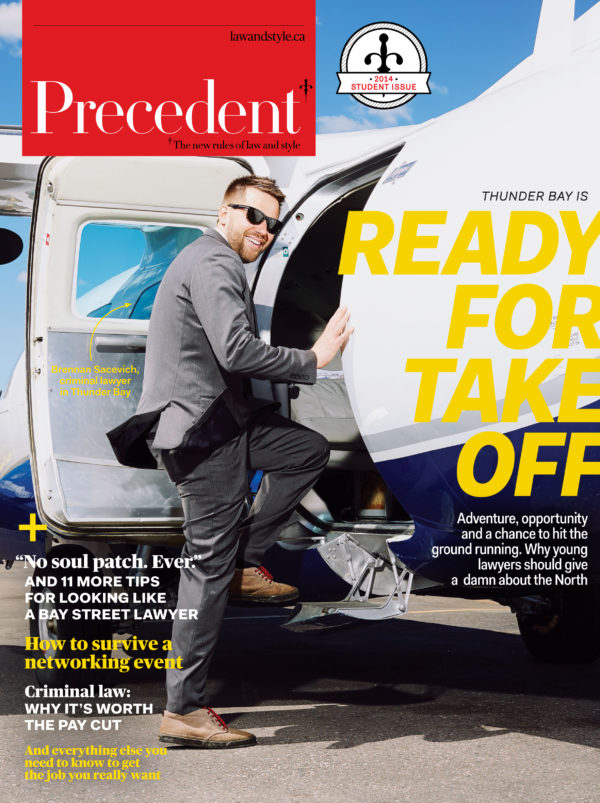
Narrow rivers and icy streams twist, turn and intersect as they carve through the endless stretch of snow-covered spruce trees. From one of nine seats on a twin-engine airplane gliding over the isolated wilderness of northwestern Ontario, Brennan Sacevich surveys the scene. On board, quarters are so close that Sacevich can chat with the pilot or, if the weather looks stormy, scan the plane’s radar for turbulence that might lie ahead. In less than an hour, he reaches his destination: Fort Hope, a First Nations community nestled within Ontario’s dense northern forestry, and home to about 1,000 people. After touching down, Sacevich hops into the back of a police pick-up truck and heads down a dirt road. As the engine starts to rumble, his thoughts turn from the scenic flight to the matter at hand: trial facts and oral arguments. After all, he’s going to court.

Sole practitioner Brennan Sacevich prepares to board the speedy Mitsubishi MU-2 he takes to visit clients in remote northern areas.
Sacevich is a criminal lawyer in Thunder Bay, who often represents First Nations youths from remote communities accessible only by air. Once a month, the 31-year-old flies to these regions, along with Crown prosecutors and judges, to conduct trials in recreation centres and residential basements. Finding a place to meet with clients — most of whom face serious charges, such as arson or aggravated assault — can be tricky. “If I’m lucky,” Sacevich says, “it might be in a small kitchen area that’s out of the way from the regular rec centre.” Sacevich is a sole practitioner, and this kind of work, funded by Legal Aid Ontario, makes up more than half of his practice. After just two years on his own, he earns enough to pay an assistant. Also, with a stable business, he can work more regular hours — when starting out, he worked seven days a week — allowing him to spend time at home with his wife, three-year-old son and one-year-old daughter.
This is the practice of law, Thunder Bay-style, where young lawyers can find success in the city’s small but fertile legal market and, on top of that, do interesting work. Indeed, Sacevich-like careers are not reserved for solo lawyers. The largest firms in Thunder Bay have around 15 lawyers, so they need junior associates to carry files, generate revenue and argue on their feet in court. With 185 lawyers in private practice, the Thunder Bay legal community is small, but growing. In fact, the entire city is on the cusp of an economic explosion. But getting to this point has been painful.
Ten years ago, Thunder Bay was in an economic dark age. For half a century, the city had one core industry: forestry. Then, in the early 2000s, demand for paper plummeted. “Think about newspapers. Nobody reads them on paper anymore,” says Douglas Murray, the CEO of the city’s economic development commission. “So we didn’t need to cut down as many trees or process as much wood.” When the recession hit in 2008, the forestry sector, hanging on by a thread for years, self-destructed. “We went from six sawmills to one and from 13 paper processing machines to one,” recalls Murray. By 2009, the unemployment rate had jumped from 5.9 percent to 8.3 percent. The collapse of forestry in Thunder Bay, says Murray, “was just as devastating as the collapse of the auto industry in Windsor and southern Ontario.”
Not surprisingly, young people left the city for jobs that, simply put, didn’t exist in Thunder Bay. Between 2006 and 2011, the city’s population, which sits around 122,000, fell by 1.1 percent. A dwindling, aging population portended a bleak economic future.
And yet, during the downturn, Thunder Bay took action. In 2005, the city opened a medical school and, two years later, an elite medical research centre. Earlier this year, a state-of-the-art courthouse, with a price tag of $247 million, opened downtown. And, since 2011, Thunder Bay has spent about $22 million transforming its industrial waterfront on Lake Superior into a scenic spot for high-end restaurants and sailing. Sacevich, who grew up in Thunder Bay before going to law school in Wales in 2005, sees the change. “Down at the waterfront, there are far more spots for fine dining than when I was a kid.”

Thunder Bay sits on the shore of Lake Superior, overlooking the Sleeping Giant, a peninsula named after an Ojibway legend about a giant turned to stone.
As the city’s mayor, Keith Hobbs, explains, “We decided to make this place look like a city and create jobs at the same time.” Indeed, there has been success: the population has grown in recent years and the unemployment rate has fallen to 4.9 percent — well below the national average of 7 percent. No longer reliant on forestry, people have found jobs in construction, education and the medical sector. The diversified economy, says Murray, is stable.
Thunder Bay is on the verge of a boom, and the central reason is mining. In northwestern Ontario, eight mines are predicted to open within 10 years, including the Ring of Fire, a massive deposit of chromite, diamonds and copper in the James Bay Lowlands. Murray says the infrastructure needed — roads and power lines — to develop the Ring of Fire in earnest might not be in place for a decade. But once operational, the mine will generate $25 billion in economic activity in the first three decades of its existence.
Some of that money, then, will go to engineers and scientists hired by mining companies — and Murray expects those skilled workers will settle in Thunder Bay, the largest city in the region. Private investors, it seems, are banking on it: a $20-million Delta hotel and a luxury condo are under construction on the waterfront.
Still, an important question remains: what does this mean for lawyers in Thunder Bay? For starters, even without mining, there are opportunities. Many northern communities, including Thunder Bay, are underserviced by lawyers that are close to retirement age. But once the mining boom arrives, demand could skyrocket, says Duncan Macgillivray, a personal injury lawyer at CARREL+Partners LLP, one of the city’s largest firms with 16 lawyers. His economic logic is simple: if mines get up and running, and the population of Thunder Bay rises, it’s inevitable that some of those new residents will get divorced, suffer injuries and commit crimes. Those people will need family, personal injury and criminal lawyers. In short, there are opportunities now — and there could be plenty in the future.
Thunder Bay is also home to the country’s youngest faculty of law. Last September, Lakehead University founded a law school in a now-defunct high school in the downtown core. From the outside, it has all the marks of a medieval castle: sandstone walls, stained glass windows and towering parapets. Despite the anachronistic architecture, the school features the province’s newest curriculum. In addition to attending traditional lectures, students learn on-the-job skills, with an emphasis on civil law, in tutorials run by local lawyers and law professors. “We’ve already written bail submissions, opinion letters, factums, client negotiations and client letters,” says Anna Fitzsimmons, the first president of Lakehead’s law students’ society. “And we did some of these in our first semester.” In the final semester of third year, students complete unpaid work placements at firms. The Law Society of Upper Canada has deemed the program so innovative it will allow Lakehead students to skip articling and become full-fledged lawyers immediately after graduating and passing the bar.

Sacevich strolls through Thunder Bay’s brand new courthouse.
According to Lee Stuesser, dean of the school, this is part of Lakehead’s broader strategy: to pump out graduates who have the legal skills in demand in Thunder Bay and across the North.
That’s not to say, however, that graduates from other law schools should steer clear of Thunder Bay. But be prepared. At smaller firms, the expectations placed on young lawyers are as high as they are on Bay Street, says Karen Drake, a University of Toronto law school alum and law professor at Lakehead. Before becoming a teacher, she articled at Cassels Brock & Blackwell LLP in Toronto and practised at a small firm in Thunder Bay. “At a large firm, no one is going to let you sit alone in a room with a client on day one, but in small firms, you have your own files,” she explains. “For the most part, you’re on your own. And it’s out of necessity: partners don’t want to bill clients for helping a young lawyer with his or her case. So you actually have to make your own legal decisions.”
If there’s a core lesson here, it’s that some of the best opportunities for young lawyers happen in the smallest corners of the country. And yet, says Macgillivray, most law schools perpetuate the myth that Bay Street is the holy grail of the legal profession. “Once you get into that mindset, you start to think that anyone who doesn’t work in Toronto is a bad lawyer,” says Macgillivray, who graduated from law school at Queen’s University in 2008, before moving to Thunder Bay. “It can be easy to forget what else is out there, which could be a lot more fun.”
That sentiment applies to lifestyle as well: Thunder Bay may not be like Toronto or Vancouver, but for many, it’s a great place to live. “Sure, if you’re into New Age art or poetry readings, this probably isn’t the place for you,” says Jordan Lester, an employment lawyer at Cheadles LLP, who was called to the bar last year. “But there are plenty of bars and restaurants — a lot more in recent years — with great music. And if you like the outdoors, whether it’s cross-country skiing, snowmobiling or hockey, this place is a mecca.” The cold weather, which averages a low of −21 C in January, even affects legal culture. “You can sacrifice fashion for practicality,” says Lester. “When I go to court, I have my suit, a big winter coat and a giant fur hat. I look like a total ass when I walk in there, but it’s warm and no one judges you.”
Despite the cold, there is a real warmth in the Thunder Bay legal community. “It sounds cliché,” says Sacevich, “but we really are like a family. Everyone is approachable, and always available to help.” He knows that, as he continues to develop as a lawyer, senior counsel at other firms will happily provide advice, as they have since he started his own practice two years ago.
Indeed, the future looks bright — both for the city and this star sole practitioner. Sacevich hopes to hire an associate later this year and will be taking on another summer student in 2015. He’s looking forward to expanding his practice as the market swells in the North. “I want to grow alongside the city.”
Thinking about building a career in Thunder Bay? Check out these top employers in the city.
Travel expenses for Daniel Fish and Jaime Hogge provided by Tourism Thunder Bay and the Ontario Tourism Marketing Partnership Corporation.

This story is from the 2014 edition of PrecedentJD Magazine
Photography by Jaime Hogge.
